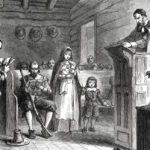J.R.R. Tolkien, the master fantasy author, thought that at the heart of every great fairy tale lies a eucatastrophe.
A ‘catastrophe’ is a disaster, an event which suddenly ruins everything. In literary theory, the catastrophe is the event that changes the direction of the plot. In a tragedy it is the final undoing and resolution. According to Tolkien fantasy stories have a eucatastrophe (that is a good catastrophe) in which, unexpectedly, good comes from evil. A eucatastrophe is a joyous “turn”, a sudden and miraculous grace.
In the Lord of the Rings, the great eucatastrophe occurs at the edge of the Crack of Doom. Frodo having travelled so far cannot bring himself to destroy the ring and instead puts it on. Gollum attacks him and the two struggle on the side of the fiery abyss. Though Fordo is invisible, Gollum manages to find his hand and bite off his finger. Finally, Gollum possesses the ring, but as he exalts in his prize he steps back, topples, wavers on the brink and then falls into the fire of Mount Doom. Gollum and the ring are gone, the evil of Sauron is destroyed and Frodo’s quest is complete. The creature who was consumed by the ring turns out to accomplish its destruction. Gandalf explains “A great Shadow has departed” and then he laughs “and the sound was like music, or like water in a parched land”.
As a Christian, Tolkien recognised that his idea of a eucatastrophe came from the gospel. He thought of the Gospels as “the greatest Fairy Story”, in which “The Resurrection is the eucatastrophe of the story of the Incarnation”. The gospel is the supreme story “and it is true” (Tolkien, On Fairy Stories).
This is a great way to think of Jesus resurrection. It is the great event in history which changes everything. Because of the resurrection, death turns to life, sorrow turns to joy. It certainly demonstrates who Jesus is and shows that his death is effective, yet it does far more than that.
Jesus entered a world which laboured under the consequences of sin and was held by the power of death. He confronted and overcame this, and his resurrection is the starting point of a whole new reality.
His resurrection is the starting point of a whole new reality
1 Corinthians 15 shows this most clearly. Paul asserts that the message of the resurrection is “of first importance” and integral to his gospel proclamation (1Cor 15:3-8). He argues that if Christ is not raised then the message of the apostles is a useless fraud and the faith of the believers is empty (vv13-15), those who have died trusting Christ are lost (v18) and believers can only be pitied (v19).
But, of course, Paul knows that Christ is risen, and his resurrection is the “first fruits”. That is, his resurrection is the beginning of a harvest. There is far more to come. Israel offered the “first fruits” of a crop to God to show their thanks and as an act of confidence in whole harvest. Jesus’ resurrection was the sign of a vast harvest to come.
But Jesus’ resurrection was not just a sign of the future, it was also the eucatastrophe. Because Jesus, God’s Son and king had died and returned to life; then everything else had changed.
Over the next few verses Paul explains that the resurrection of Christ is the undoing of Adam. Death came through a man: Adam’s sin undid life for all since he acted as a representative. This is reversed by Jesus. He lived the human life Adam should have lived, died to take the penalty for human sin and rose with the life which is life for all. Everything that was lost, ruined, corrupted and cursed in Adam, is restored, mended, returned, blessed in Jesus. In his resurrection, creation is brought to its goal and fulfilment.
Paul sets out that the resurrection establishes that Christ now rules (vv25-27) and that he will return to fully establish his kingdom (vv28, 49-54). So, the resurrection both changes life now and guarantees the future.
Other places in the New Testament make similar points. Because of the resurrection, Christ has the Spirit who he pours out on the church (Acts 2:33). The Spirit raised Jesus and is the gift of the risen Jesus and the presence of the risen Jesus. By him believers participate now in Christ, and all the blessings he has won for us.
Because of Jesus’ resurrection, God’s future kingdom has already begun and believers now share in that. They experience Jesus’ resurrection to new life by his Spirit (Rom 6:4; 8:11 Eph 2:6; Phil 3:10). Participation in Jesus’ resurrection life is the source for renewed life. Believers now live for him, living out the eschatological life we have in him (Rom 14:7-8; 2 Cor 5:15; Eph 5:14).
It is the event which turned history around. It is the great eucatastrophe. We live with its consequences now, and we will forever. The harvest has begun, soon our tears will turn to laughter.
The future which has begun will unfold when Christ returns. That’s the full harvest. Believers will share in the resurrection (Rom 6:5; 1 Cor 6:14; 1 Cor 15:42ff; 2 Cor 4:14; Col 2:12; Col 3:1; Phil 3:11; 1 Thess 4:16). The whole of creation will share in the glorious renewal of this resurrection (Rom 8:19-21).
Jesus resurrection is an historical event which took place in Jerusalem in Passover, 33 AD. It is the event which turned history around. It is the great eucatastrophe. We live with its consequences now, and we will forever. The harvest has begun, soon our tears will turn to laughter.
This article has been written in conjunction with the release of our brand new digital evangelism resource: ‘Jesus: History’s Biggest Hoax?’. You can check it out here. Plus, we’ve put together a landing page full of extra reading and resources about the historicity of the resurrection, which you can see here.















